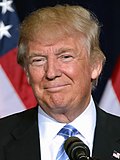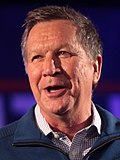2016 Nevada Republican presidential caucuses
| |||||||||||||||||||||||||||||||||||||||||||||||
30 pledged delegates to the Republican National Convention | |||||||||||||||||||||||||||||||||||||||||||||||
|---|---|---|---|---|---|---|---|---|---|---|---|---|---|---|---|---|---|---|---|---|---|---|---|---|---|---|---|---|---|---|---|---|---|---|---|---|---|---|---|---|---|---|---|---|---|---|---|
| |||||||||||||||||||||||||||||||||||||||||||||||
 Election results by county.
Donald Trump
Ted Cruz | |||||||||||||||||||||||||||||||||||||||||||||||
| Elections in Nevada |
|---|
 |
| None of These Candidates |
The 2016 Nevada Republican presidential caucuses took place on February 23 in the U.S. state of Nevada, marking the Republican Party's fourth nominating contest in their series of presidential primaries ahead of the 2016 presidential election.
With the Democratic Party having already held its Nevada caucuses three days earlier on February 20, the Republican caucus in Nevada was the only presidential primary on that day.
During the 2015 legislative session, lawmakers attempted to change the caucus into a regular primary and at a much earlier date,[1] however the bill failed to get to a vote.[2]
Nine candidates were eligible:[3][4]
- Jeb Bush (dropped out)
- Ben Carson
- Chris Christie (dropped out)
- Ted Cruz
- Carly Fiorina (dropped out)
- Jim Gilmore (dropped out)
- John Kasich
- Marco Rubio
- Donald Trump
Debates and forums[]
December 15, 2015 – Las Vegas, Nevada
The fifth debate was held on December 15, 2015, at the Venetian Resort in Las Vegas, Nevada.[5] It was the second debate to air on CNN, and was also broadcast by Salem Radio. The debate was moderated solely by Wolf Blitzer with Dana Bash and Hugh Hewitt serving alongside as questioners.[6]
The debate was split into primetime and pre-primetime groups based on averaged polling numbers; in order to participate in the main debate, candidates had to meet one of three criteria in polls conducted between October 29 and December 13 which were recognized by CNN—either an average of at least 3.5% nationally, or at least 4% in either Iowa or New Hampshire.[7] The secondary debate featured candidates that had reached at least 1% in four separate national, Iowa, or New Hampshire polls that are recognized by CNN.[7] Paul was included in the main debate after not qualifying under the original rules because he received 5% support in Iowa in a Fox News poll.[6][8]
The debate lineup was announced on December 13 to include Trump, Cruz, Rubio, Carson, Bush, Fiorina, Christie, Paul, and Kasich in the primetime debate, and Huckabee, Santorum, Graham, and Pataki in the undercard debate.[6] Commentators suggested that the key confrontation would be between Trump and Cruz, based on their respective polling in Iowa.[9]
Eighteen million people watched the debate, making it the third-largest audience ever for a presidential primary debate.[10] During the debate, the audible coughing was attributed to Ben Carson. His campaign admitted that they all got sick a month prior and Carson had kept the cough for weeks. The cough was "almost gone" and Carson was not really sick at the time.[11]
The undercard debate was the fourth and final debate appearance of Senator Lindsey Graham and former Governor George Pataki, who suspended their campaigns on December 21[12] and December 29,[13] respectively.
Endorsements[]
Having been swept into numerous offices in the previous election, many new Nevada Republican officeholders came out in support of various candidates. Notably, there were splits among different groups of Republicans towards their endorsements. Legislators who had supported a controversial tax hike during the 2015 session came out in support of Jeb Bush and Marco Rubio, while those who opposed it supported Rand Paul, Ted Cruz or Donald Trump.
(Note: This list contains endorsements only for candidates who were still running at the time of the caucuses)
Ted Cruz
- Attorney General Adam Laxalt
- Assemblywoman Michelle Fiore
- Assemblywoman Victoria Seaman
- Assemblyman Ira Hansen
- Assemblyman John Moore (also supported Rand Paul)
- Assemblyman Jim Wheeler
- Assemblywoman Vicki Dooling
John Kasich
- State Controller Ron Knecht
- Assemblyman John Hambrick (Speaker) (previously endorsed Jeb Bush)
- Las Vegas City Councilman Bob Beers
Marco Rubio
- U.S. Senator Dean Heller
- Congressman Mark Amodei
- Congressman Cresent Hardy
- Lieutenant Governor Mark Hutchison
- State Senator Michael Roberson (Majority Leader)
- State Senator Joe Hardy (President Pro Tempore)
- State Senator Patricia Farley
- State Senator Becky Harris
- State Senator Scott Hammond
- State Senator Ben Kieckhefer
- Assemblyman Paul Anderson (Majority Leader) (previously endorsed Jeb Bush)
- Assemblyman Stephen Silberkraus
- Assemblyman Lynn Stewart
- Assemblyman Derek Armstrong
- Assemblyman Randy Kirner
- Assemblyman David Gardner (previously endorsed Jeb Bush)
- Assemblyman Glenn Trowbridge
- Assemblyman Pat Hickey
- Assemblyman Erv Nelson
- Former Governor Robert List
- Former Lieutenant Governor Lorraine Hunt-Bono
- Former Clark County Commissioner Bruce Woodbury
- Former North Las Vegas Mayor Shari Buck
Donald Trump
- Assemblyman Brent Jones
Opinion polling[]
| List of polls | ||||||||||||||||||||||||||||||||||||||||||||||||||||||
|---|---|---|---|---|---|---|---|---|---|---|---|---|---|---|---|---|---|---|---|---|---|---|---|---|---|---|---|---|---|---|---|---|---|---|---|---|---|---|---|---|---|---|---|---|---|---|---|---|---|---|---|---|---|---|
|
Results[]
Primary date: February 23, 2016
County conventions: March 12 - April 2, 2016 (presumably)
State convention: May 7–8, 2016 (presumably)
National delegates: 30
| Candidate | Votes | Percentage | Actual delegate count | ||
|---|---|---|---|---|---|
| Bound | Unbound | Total | |||
| Donald Trump | 34,531 | 45.75% | 14 | 0 | 14 |
| Marco Rubio | 17,940 | 23.77% | 7 | 0 | 7 |
| Ted Cruz | 16,079 | 21.30% | 6 | 0 | 6 |
| Ben Carson | 3,619 | 4.79% | 2 | 0 | 2 |
| John Kasich | 2,709 | 3.59% | 1 | 0 | 1 |
| Invalid | 266 | 0.35% | 0 | 0 | 0 |
| Rand Paul (withdrawn) | 170 | 0.23% | 0 | 0 | 0 |
| Jeb Bush (withdrawn) | 64 | 0.08% | 0 | 0 | 0 |
| Chris Christie (withdrawn) | 50 | 0.07% | 0 | 0 | 0 |
| Carly Fiorina (withdrawn) | 22 | 0.03% | 0 | 0 | 0 |
| Mike Huckabee (withdrawn) | 21 | 0.03% | 0 | 0 | 0 |
| Rick Santorum (withdrawn) | 11 | 0.01% | 0 | 0 | 0 |
| Jim Gilmore (withdrawn) | 0 | 0 | 0 | ||
| Unprojected delegates: | 0 | 0 | 0 | ||
| Total: | 75,482 | 100.00% | 30 | 0 | 30 |
| Source: The Green Papers | |||||
Donald Trump received more votes than the combined total of the 2012 Nevada caucuses, while also beating Mitt Romney's previous two records.[16] On the eve of the caucuses, Trump stopped by Palo Verde High School in Summerlin to greet voters.[17]
References[]
- ^ "AB302". www.leg.state.nv.us. Retrieved 2016-04-23.
- ^ "Nevada plan to dump presidential caucus falls short". POLITICO. Retrieved 2016-04-23.
- ^ WRAL: NC approves 27 candidates for presidential primary ballots
- ^ NC State Board of Elections presidential primary candidates' list (preliminary)[permanent dead link]
- ^ "2016 Presidential Debates Fast Facts". CNN. August 20, 2015. Retrieved September 13, 2015.
- ^ a b c Scott, Eugene (December 14, 2015). "Stage set for final GOP debate of 2015". CNN. Retrieved December 15, 2015.
- ^ a b "CNN Republican presidential debate criteria announced". CNN. November 20, 2015. Retrieved November 20, 2015.
- ^ "How Rand Paul barely made it into Tuesday's main debate". www.cbsnews.com. Retrieved 2016-01-02.
- ^ Sahil Kapur; Michael C Bender; Kevin Cirilli (December 15, 2015). "How the Fifth Republican Debate Could Reshape the Race". Bloomberg.com/politics.
- ^ "18 million watched Republican debate". USA TODAY. Retrieved 2015-12-17.
- ^ "The Cough That Consumed the GOP Debate". ABC News. 2015-12-16. Retrieved 2015-12-17.
- ^ "First on CNN: Graham ends his campaign for the White House". CNN. December 21, 2015.
- ^ "Former ny gov. george pataki says he's planning to drop white house bid". abc13. December 29, 2015. Archived from the original on January 4, 2016. Retrieved December 29, 2015.
- ^ "CNN/ORC Poll" (PDF). ORC International. Retrieved February 17, 2016.
- ^ "CNN/ORC Poll". ORC International. Retrieved February 17, 2016.
- ^ "Trump Has Won More Votes Than Romney Had At This Point in 2012". Weekly Standard. 2016-02-24. Retrieved 2016-04-22.
- ^ Segal, Cheryl. "Trump takes caucus site by surprise". TheHill. Retrieved 2016-04-22.
- 2016 United States Republican presidential primaries by state
- 2016 Nevada elections
- Nevada Republican caucuses




